|
|
|
Sort Order |
|
|
|
Items / Page
|
|
|
|
|
|
|
| Srl | Item |
| 1 |
ID:
118747
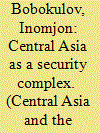

|
|
|
|
|
| Publication |
2012.
|
| Summary/Abstract |
The academic community is aware of three hypostases of Central Asia-(1) a geographical region; (2) a political entity; and (3) a civilizational expanse-each with its own limits. As a geographical region, Central Asia is limited by "natural borders" (mountains, rivers, the steppe, and the sea); as a political entity, it is contained within the state borders of the new political units; and as a civilizational expanse, it is described as the local peoples' cultural and/or ethnolinguistic community, that is, by civilizational factors.
|
|
|
|
|
|
|
|
|
|
|
|
|
|
|
|
| 2 |
ID:
118740
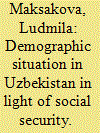

|
|
|
|
|
| Publication |
2012.
|
| Summary/Abstract |
Demographic development issues in today's world are undeniably important. The rapid growth of the world's population, shortage of resources, and increase in migration are creating numerous difficulties in affording a dignified standard and quality of life on the planet. The size of a country's population, its distribution, and its gender-age composition frequently come forward as strategic factors in economic development and the formation of its future parameters.
|
|
|
|
|
|
|
|
|
|
|
|
|
|
|
|
| 3 |
ID:
118748


|
|
|
|
|
| Publication |
2012.
|
| Summary/Abstract |
At the beginning of July 2012, the media and Internet reported that a documentary film shown on Uzbekistan's Eshlar TV channel had compared social networks (in particular Facebook and Odnoklassniki) to machineguns and nuclear bombs. Social networks were also likened to weapons in the hands of the enemy.
During the program, an expert from the Spirituality and Enlightenment Center asked the following question: "What is the difference between a terrorist and a blogger's page on a social network showing photographs of naked people?" He also noted that "if terrorists kill people using weapons and bombs, Internet users are ultimately being killed with the aid of 'sweet words;' this kind of mass culture poses a direct danger to our state policy and our sovereignty."
|
|
|
|
|
|
|
|
|
|
|
|
|
|
|
|
| 4 |
ID:
118742
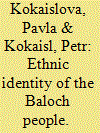

|
|
|
|
|
| Publication |
2012.
|
| Summary/Abstract |
The national self-awareness of the Balochis, who live in several countries and have no statehood, is very specific in many ways. The problem of their identity can be better understood in the context of certain parallels between them and European peoples (ethnic groups), since their ethnogenesis displays certain common features. We should bear in mind, however, that the formation and development of the Balochis differed in many respects from those of the European peoples.
The Balochis of Iran, Afghanistan, Pakistan, and Turkmenistan are not absolutely identical, in this respect they differ greatly from the Europeans.
|
|
|
|
|
|
|
|
|
|
|
|
|
|
|
|
| 5 |
ID:
118749


|
|
|
|
|
| Publication |
2012.
|
| Summary/Abstract |
What would happen to the economies of the former Soviet Union if they finally implemented a full-fledged free trade agreement? How would this change sector output, GDP, prices, international trade, and the economic welfare of the nation? How would it affect the economies of the FSU's other trading partners? This paper attempts to address these and other issues through the use of a computable general equilibrium model (CGE). The model is a large, multi-regional, multi-sectoral, multi-factor system of simultaneous equations. It introduces the "shock" of zero tariffs between all FSU's trading partners, and solves for a new economic equilibrium. There are some political and practical obstacles to the completion of such a trade agreement, so this mathematical model in some ways is just a hypothetical experiment. But an analysis of trade effects can nonetheless be useful to any policymaker in the former Soviet space.
|
|
|
|
|
|
|
|
|
|
|
|
|
|
|
|
| 6 |
ID:
118738
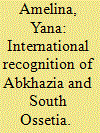

|
|
|
|
|
| Publication |
2012.
|
| Summary/Abstract |
The August 2008 war and recognition, on 26 August, 2008, of the independence of the Republic of Abkhazia and the Republic of South Ossetia by the Russian Federation and, later, by several other countries created a new situation in the Greater Caucasus, which many of the regional and world geopolitical players have found unpalatable. Their active efforts to change the new reality run up against the recognition of independence of these two states, which Russia cannot revoke without losing its international prestige and influence in the Caucasus right up to possible secession of the Northern Caucasus. The above-mentioned players have no choice but to use force to liquidate the republics of South Ossetia and Abkhazia; if this happens, complete and final destabilization of the Caucasus will be inevitable.
|
|
|
|
|
|
|
|
|
|
|
|
|
|
|
|
| 7 |
ID:
118744
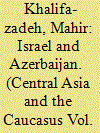

|
|
|
|
|
| Publication |
2012.
|
| Summary/Abstract |
It is well known that Azerbaijan's history does not have any anti-Semitic traditions. And during the time of the Russian and Soviet empires, Azerbaijan was not poisoned by anti-Semitism. Obviously, anti-Semitism has not been an issue in Azerbaijan. Moreover, many famous Jews were born and studied in Azerbaijan. The brilliant scientist of modern physics and Nobel Prize Laureate Lev Landau was born in Baku, Azerbaijan, in 1908 and attended Baku State University in 1922.
After the disintegration of the Soviet Union, the historically close and warm relations between the Jews and Azeris became a solid base for mutual cooperation between the State of Israel and the Republic of Azerbaijan. Both countries have a strategic location but an unfriendly foreign environment, which pushes them to be close and expand cooperation. Azerbaijan and Israel cooperate to counteract or neutralize foreign threats, which is the subject of this paper.
|
|
|
|
|
|
|
|
|
|
|
|
|
|
|
|
| 8 |
ID:
118741
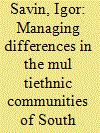

|
|
|
|
|
| Publication |
2012.
|
| Summary/Abstract |
Kazakhstan is frequently looked upon as a country that has succeeded in harmonizing an extremely ethnically and confessionally diverse social environment. There are indeed reasons for such inferences, one in particular being the absence of open mass opposition among different groups of the population in the Republic of Kazakhstan. However, this in no way means that the country's social development is entirely free of collisions or inter-group tension. Such conflict is apt to erupt whenever the government and society fail to react on time to the challenges arising in our ever complicated social world.
|
|
|
|
|
|
|
|
|
|
|
|
|
|
|
|
| 9 |
ID:
118739
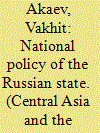

|
|
|
|
|
| Publication |
2012.
|
| Summary/Abstract |
On 23 January, 2012, Nezavisimaia gazeta carried an article by Prime Minister of Russia Vladimir Putin entitled "Russia: The National Question," which took the Russian public by surprise. Indeed, this was the first time in his twelve years on the political Olympus that the Russian leader had turned to the national question. The article invited very contradictory opinions and sent waves in all directions.
|
|
|
|
|
|
|
|
|
|
|
|
|
|
|
|
| 10 |
ID:
118743


|
|
|
|
|
| Publication |
2012.
|
| Summary/Abstract |
Everyone knows that in addition to its keen interest in the Southern and Northern Caucasus, the People's Republic of China (PRC) is also active in Central Asia, another area of its geopolitical interests.
Much has and is being written about this, but for some reason no one has examined China's presence in the Northern Caspian (I have in mind the Atyrau Region of Kazakhstan, the relations with which are part and parcel of China's Central Asian policy, and the Astrakhan Region and Kalmykia of Russia).
Here I will dwell on Chinese strategy in the two latter regions of the Russian Federation, that is, in the Russian part of the Northern Caspian. As a sort of corridor or link between Central Asia and the Caucasus with a multitude of ties between them and this part of Russia, the region is of immense geopolitical importance for Beijing.
|
|
|
|
|
|
|
|
|
|
|
|
|
|
|
|
| 11 |
ID:
118746
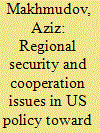

|
|
|
|
|
| Publication |
2012.
|
| Summary/Abstract |
It stands to reason that at the early stage of independence the five republics in the Central Asian region-Kazakhstan, Kyrgyzstan, Tajikistan, Turkmenistan, and Uzbekistan-previously closely linked to the Soviet economic and political systems, faced a number of challenges, most of which were inherited from the Czarist-Soviet regimes. Coping with the challenges posed by the transition period required foreign support, and all the republics, except Turkmenistan, have been engaged in active cooperation with global powers such as the U.S.
|
|
|
|
|
|
|
|
|
|
|
|
|
|
|
|
| 12 |
ID:
118745


|
|
|
|
|
| Publication |
2012.
|
| Summary/Abstract |
The Syr Darya river (together with the Naryn river) has the length of 3,019 km and its basin is a part of the Aral Sea basin, which makes it one of the most important transboundary rivers in Central Asia. The river is formed in Kyrgyzstan and flows through Tajikistan, Uzbekistan, and Kazakhstan. The flow of the Syr Darya river and its tributaries are regulated by a series of reservoirs built during the Soviet and post-Soviet period. The most important among them is the Toktogul reservoir with 19.5 cu km water storage capacity. Toktogul was constructed in the 1970s, and is currently located in the territory of Kyrgyzstan. The reservoir area is approximately 280 sq km and is capable of regulating the flow of the Syr Darya river.
|
|
|
|
|
|
|
|
|
|
|
|
|
|
|
|
|
|
|
|
|